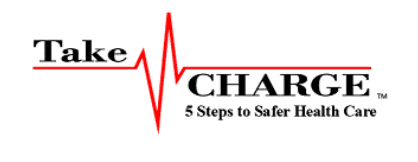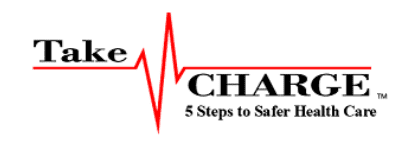June 2024
Sally: Hi Dad, how’s it going?
Dad: Oh, can’t complain, I guess. For a guy my age, that is.
Sally: Well that doesn’t sound too good. What’s the matter?
Dad: I’m sure it’s nothing serious, but my stomach – or something in that area – has been giving me grief lately.
Sally: Have you seen a doctor?
Dad: Not yet, but I have an appointment for June 15th.
Sally: Huh – the day before Father’s Day!
Dad: Yes, I guess it is.
Sally: Listen – my brother and I already have a nice Father’s Day surprise planned for you, but in the meantime, I’ve been hearing about this thing called the TakeCHARGE Campaign: 5 Steps to Safer Health Care. It’s five things we can all do to stay safer when preparing to get medical care. One of them – the Step for June – is “Prepare for Doctor and Hospital Visits: Make a List of Questions”. How about as a “Father’s Day bonus” I help you do that?
Dad: But the doctor will tell me what’s wrong, no?
Sally: First the doctor has to understand what your symptoms are, and what you think about them. What’s the first thing you’d ask?
Dad: I’d say, “Why has my stomach been killing me for the last month? Is it acid reflux? An ulcer? Cancer?”
Sally: Well you’re not actually dying, so can you be more specific?
Dad: OK, I’ve had a bad pain in my midsection.
Sally: How would you describe it? Sharp? Dull? Where exactly does it hurt? Does it happen all the time or just sometimes (and if so, when)? Is there anything you do that helps it or makes it worse? Do you have any other symptoms besides the pain?
Dad: I see what you mean, there are a lot of things to think about and remember!
Sally: That’s right. And you’re probably wondering if it’s serious or not, and if there are tests that might tell the doctor more, and if there are treatments for whatever it turns out to be. That’s why it’s important to write these things down, so nothing gets forgotten in the heat of the moment when you’re face-to-face with the doctor.
Dad: Thanks Sally, this is actually a pretty good “Father’s Day Gift”! I wish more kids thought of helping the “old man” prepare for a medical visit.
Yes! TakeCHARGE Step 3 is a good thing every “kid” high-school age to retiree can do for a father who has an upcoming doctor or hospital visit: help them make a list of symptoms and questions.
And while you’re at it, encourage everyone in the family to do the 5 Steps at any time of year.
1. Understand and Complete your Advance Directives (such as a Healthcare Proxy)
2. Keep Track of Your Medical History and Current Medications
3. Prepare for Doctor or Hospital Visit: Make a List of Questions
4. Help Prevent Infections: Ask Caregivers to Wash Their Hands
5. Use an Advocate, Be an Advocate for Others
To learn more about the TakeCHARGE Campaign from Pulse Center for Patient Safety Education & Advocacy: https://takecharge.care/ and https://www.pulsecenterforpatientsafety.org/take-charge

